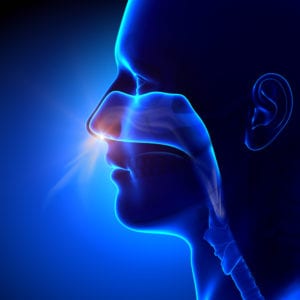 In the animal kingdom, you don’t find many mammals that breathe through their mouths, and when they do, it’s typically when they have respiratory infections. Yet many humans can be found, each night, mouth-breathing their way through their 7-8 hours of daily rest! Why do we breathe through our mouths when the nasal passage is perfectly designed to filter air and maximize oxygen extraction with every breath?
In the animal kingdom, you don’t find many mammals that breathe through their mouths, and when they do, it’s typically when they have respiratory infections. Yet many humans can be found, each night, mouth-breathing their way through their 7-8 hours of daily rest! Why do we breathe through our mouths when the nasal passage is perfectly designed to filter air and maximize oxygen extraction with every breath?
Regardless of the cause, breathing through your mouth speeds up the breathing process, denying you the benefits of the slow nasal exhale needed to deliver oxygen to all vital systems and organs in your body. The medical community may be divided on the dangers of chronic mouth-breathing in adults, but in children it has been linked with juvenile apnea and ADD, and can be detrimental to proper facial and jaw development. I’d say that’s a sign we can all learn from. We know that narrow airways in adults affect their ability to breath properly at night, and sleep apnea and snoring are chronic problems that are far from being cured.
Mouth breathing often starts when we are young, yet we don’t seek medical intervention until our spouses complain of our snoring, sending us on a wild goose chase of snoring remedies, many of which don’t work. If you are not getting enough oxygen at night, an oral appliance or CPAP can certainly help, but for those patients who seek to heal their breathing problems, there is an alternative therapy that may offer relief.
Buteyko Nasal Breathing
In the 1950’s, Ukrainian doctor Konstantin Buteyko developed a series of breathing exercises to address a host of medical conditions he believed were caused by chronic hyperventilation. While there’s not a lot of medical research to back up his assumptions, there has been some evidence that his methods can help asthma sufferers retrain their lungs for better function.
There’s no arguing that Buteyko’s breathing exercises have endured, as numerous advocates of his methods have taken up the cause around the world. Whether we subscribe to all his theories or not, there’s a wealth of anecdotal evidence to support the value of his work.
We also know that nasal breathing is preferred during exercise, as it keeps the heart rate down, increases stamina and endurance, and better oxygenates the blood. The Tarahumara native tribe are renowned for their long-distance running abilities (and quality of life), and they breathe exclusively through the nose during their insanely long runs. Yoga practitioners are also advocates of controlled Pranayama breathing through the nasal passage. But even if you’re a subscriber to Western medicine only—you can’t argue with the benefit of optimal oxygenation for the brain, lungs and blood. Fine-tuning your breathing mechanisms can only have positive outcomes!
How to Do It
Snoring is caused by turbulent airflow in narrow nasal airways, but the human body is an incredibly adaptive organism, capable of transforming itself with devoted training. If you’re a snorer, you can’t very well consciously tell yourself to close your mouth when you sleep, but you can practice nasal breathing using Buteyko exercises when you are awake. Over time, if you gradually increase your resting nasal breathing, your body will become a more efficient consumer of oxygen, giving you more restful, quieter sleep, and enhanced overall health.
If you’re interested in learning how to drop the mouth breathing habit, for yourself or your family, check out Patrick McKeown’s books or the Buteyko Clinic International to learn how to retrain your body for optimal breathing.
About the Author: Dr. Mickiewicz owns a private practice in Sacramento and lectures across the nation on TMD treatments. He is a diplomate of the American Academy of Pain Management and holds membership in many professional associations for dentistry, sleep medicine, and TMD. In addition, Dr. Mick, as his patients call him, founded Pacific Orofacial Pain Consultants, a team of experts in various disciplines, who tackle the issue of TMD pain and treatment, to help sufferers find relief from chronic pain. To talk with Dr. Mick, call his Sacramento dental office at 916-457-7710.


